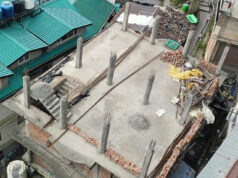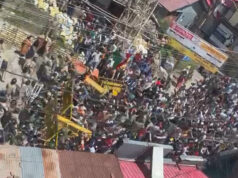The hearing on the alleged illegal construction at the Sanjauli mosque in Shimla has been postponed until October 5, following a hearing at the Municipal Corporation Commissioner’s court on Saturday. The case, which has seen 45 hearings since the first complaint was filed in 2009, involves accusations of unauthorized expansion of the mosque from its original structure of one floor and an attic to a five-floor building, despite repeated orders to halt construction.
The hearing was attended by representatives from both sides. The Waqf Board’s lawyer argued that the mosque has existed on Waqf Board land since before 1947. However, the Municipal Corporation claims that illegal construction has occurred over the years, including during the hearing process. The court has now directed a junior engineer to prepare a report on the extent of unauthorized construction at the site, which will be reviewed in the next hearing.
The Sanjauli mosque controversy began in 2009 when the first complaint was lodged with the Municipal Corporation, accusing the mosque management of illegal construction. Originally a single-floor structure with an attic, by 2024, the building had grown to five floors. The Municipal Corporation administration alleges that several stop-work orders were issued over the years, but construction continued despite these directives. According to the corporation, more than five orders to halt work were ignored.
During the hearing, the Waqf Board was officially made a party to the case. The Board has submitted a response, arguing that the land on which the mosque stands is legally owned by them and has been in place since before India’s independence. The board claims that they have followed proper procedures and that the structure has been in continuous use since before 1947. However, questions regarding the funding for the mosque’s expansion have yet to be fully answered, with the Board’s lawyer admitting that contributions were made by traders, though details on whether the funds were given in cash or by cheque were not provided.
Adding to the complexity of the case, a local residents’ society submitted a 20-page written application during the hearing, requesting to be made a party in the proceedings. The society, represented by advocate Jagat Pal, argues that the mosque is built on government land, registered in official records under Khasra number 36 as Gair Mumkin Masjid. The society has called for the removal of any unauthorized construction on what they claim is government property.
The Sanjauli mosque dispute escalated from a physical altercation in the nearby Malyana area. The controversy began when a local man was allegedly beaten, and it was claimed that the accused took refuge in the mosque after the attack. This led to protests by Hindu organizations, who labeled the mosque’s construction illegal and called for its demolition. The situation eventually reached the Himachal Pradesh Legislative Assembly, where it became a point of contention, sparking several demonstrations.
With the next hearing now scheduled for October 5, both sides await the junior engineer’s report on the extent of illegal construction at the mosque. The case, which has seen numerous delays and hearings, continues to be a focal point of tension between local residents, the Waqf Board, and government authorities.











